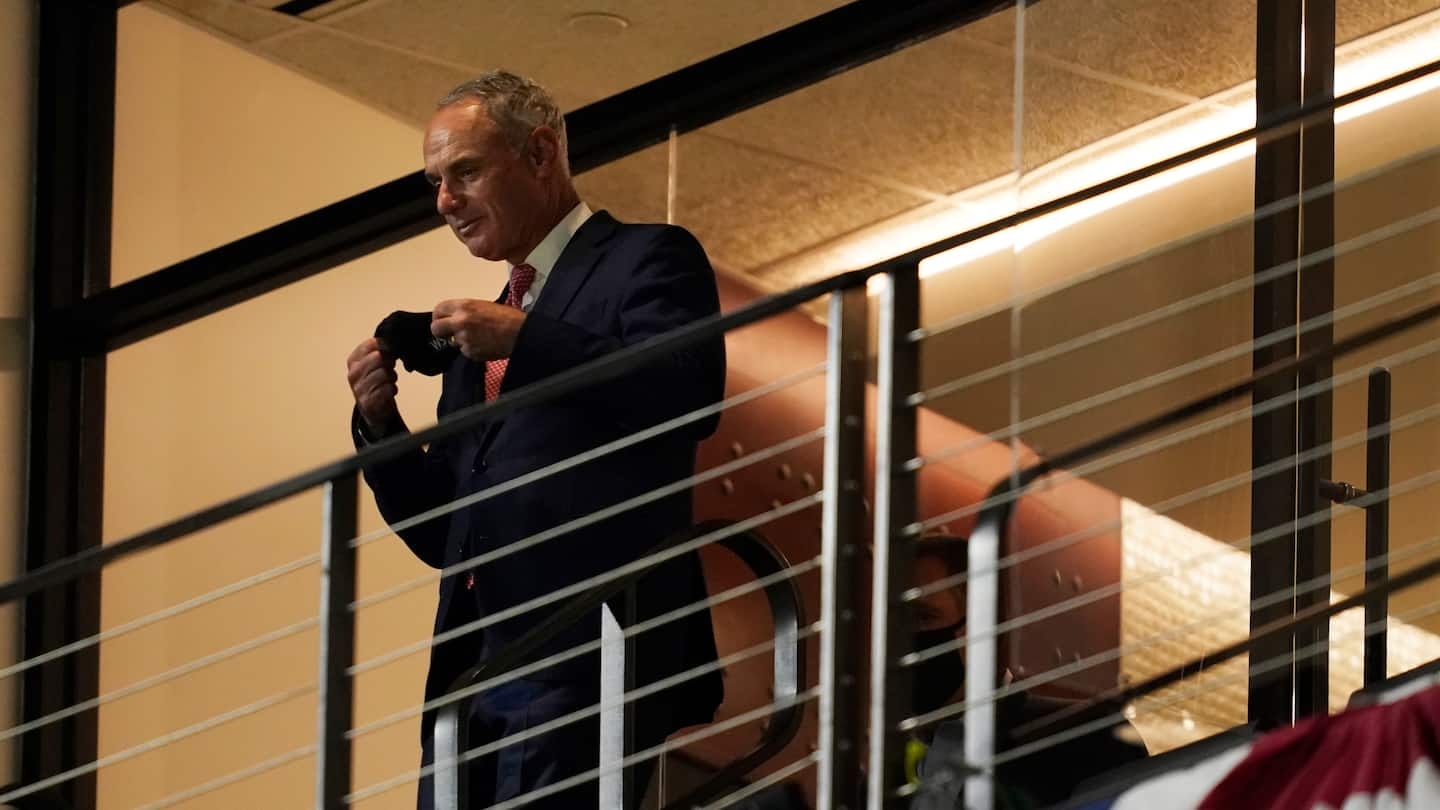Baseball fans’ biggest problem with Rob Manfred? He doesn’t appear to be one of them.

Almost six years into Rob Manfred’s tenure as his successor, such passion for the game is sorely missed. Manfred publicly referred to the World Series trophy as “a piece of metal” while defending his unconscionable handling of the Houston Astros’ sign-stealing debacle.
2020 has been difficult for everyone — in sports and in the world. But Manfred hasn’t gotten anything right, and his comments this week offered more proof of how little he understands or cares about the game.
Manfred, who makes $11 million a year with annual raises built into his contract through 2024, understands one thing: money. He claims to love baseball, but everything he wants to do — including keeping the expanded playoff format and starting extra innings with a runner on second beyond this strange season — seems aimed at making the owners more money.
Manfred came into office in January 2015 vowing to fix the game’s pace-of-play problem. He appointed a pace-of-play commission that made several recommendations. When games got a little bit faster — actually dropping to three hours per game for nine-inning games in 2018 — Manfred acted as if he had discovered fire.
The euphoria didn’t last. Average game time hit a new high this season for nine-inning games: 3 hours 7 minutes. Manfred, who has the authority to put in a pitch clock without the approval of the players’ union, has wavered on the issue for three years, with no end in sight.
The minute it became apparent this season was going to have to be played in empty stadiums, Manfred and the owners began moaning about their losses, even though the game has never been healthier financially than in recent seasons. New contracts with regional television networks have lined the owners’ pockets, and attendance has been strong.
On March 26, the owners, with Manfred the lead negotiator, agreed to pay the players on a prorated basis for a shortened season. Two months later, they tried to renege on that deal, saying they had made it not knowing they might have to play without fans in attendance.
June was an ugly, month-long back and forth between players and owners, fighting over money, as they have done so often in the past 50 years. On June 10, Manfred guaranteed there would be a season. Five days later, he said he was “not confident” of one.
Such leadership!
Ultimately, there was a 60-game regular season, and the owners made up a lot of their lost revenue by expanding the playoffs from 10 to 16 teams and adding a best-of-three first round. Because the schedule was so compressed, including many novel coronavirus-related postponements, doubleheaders consisted of seven-inning games, and extra innings in all games began with a runner on second base.
Under the circumstances, these changes were understandable. But to consider extending them beyond the current situation ignores what makes baseball unique among major sports.
The regular season has more meaning than any other. It is long — normally 162 games — meaning one hot or cold streak doesn’t decide a season. The Washington Nationals demonstrated this last year, winning the World Series as a wild card after starting the season 19-31.
Plus, unlike in basketball and hockey, making the playoffs is difficult, and the four wild-card qualifiers face each other in a single-elimination game to reach the final eight. This year, two sub-.500 teams made the postseason, and one of them, the Astros, came within a game of sullying the World Series.
Of course, Manfred had done that himself before the pandemic shutdown, when he refused to strip the Astros of their ill-gotten 2017 World Series championship. In the wake of the sign-stealing scandal, the team was fined $5 million (or the cost of a backup second baseman), and general manager Jeff Luhnow and manager A.J. Hinch were suspended for 2020 before getting fired. No players were punished because they had been granted immunity to get them to tell the truth.
But Manfred allowed the team to keep the title, calling the trophy “a piece of metal” when people suggested he had made a mistake. Tell that to the teams the Astros beat on their way to the championship or those teams’ fans. That comment, for which Manfred later apologized, reflected his inability to lead the sport.
Now he is pushing to expand the postseason on a permanent basis. How many teams, Rob? Sixteen? Twenty-four? Everyone except the New York Mets and Boston Red Sox? (Manfred claims he grew up a New York Yankees fan.)
He also is considering continuing the ridiculous runner on second base rule in extra innings. Is this Little League? If a game isn’t over after 12 innings, should each team pick a batter for a Home Run Derby? That would be fun, right? It wouldn’t be baseball, but who cares?
At least there won’t be seven-inning doubleheader games — but that has more to do with owners wanting to charge separate admissions when weather forces two games in a day.
Manfred doesn’t have the fortitude to insist on a pitch clock and other serious measures to help the pace of play, but if any gimmicks can make the owners more money (expanded playoffs) or inject artificial excitement into the game (second base rule), he’s all for them.
It’s enough to make real baseball fans miss Selig. For all of his flaws, it was clear he loved the same sport they did.






